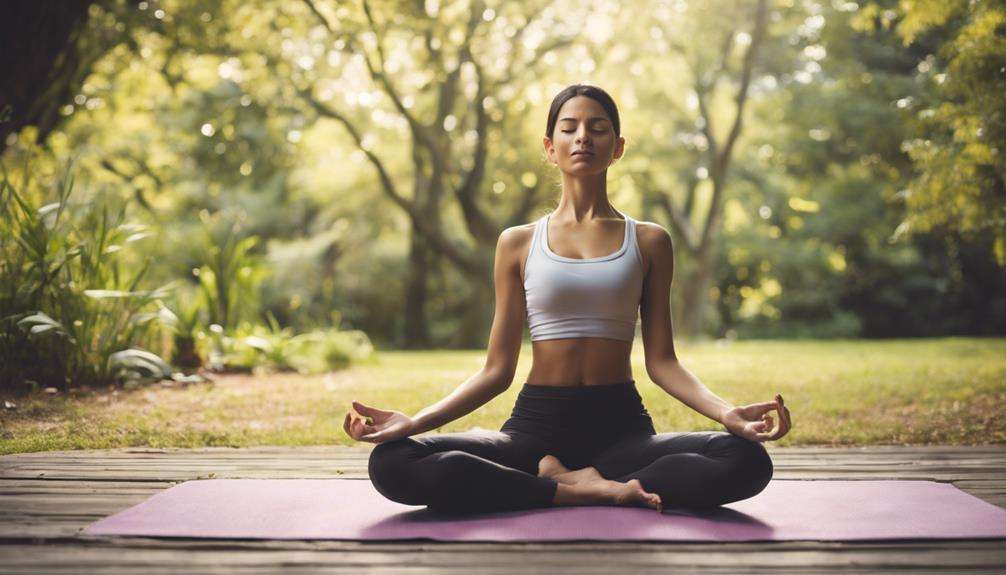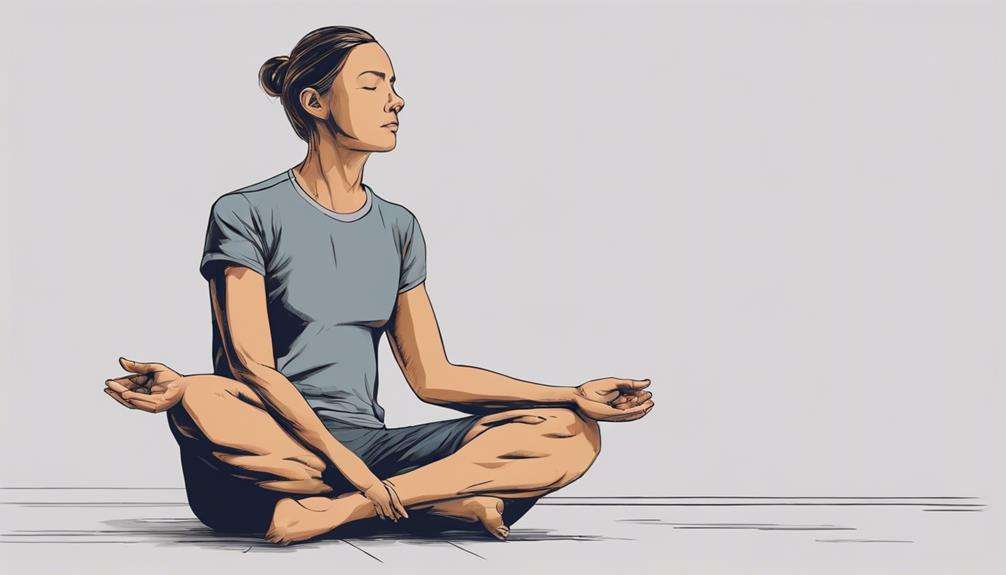Imagine a serene lake, its surface smooth and undisturbed. Just as the lake remains calm amidst the external chaos, mindfulness practices can help you find tranquility within yourself.
By exploring various techniques tailored for stress reduction and relaxation, you can discover a world of inner peace and emotional balance. These practices offer a gateway to a calmer, more centered existence.
Discover how mindfulness can transform your daily life and empower you to navigate challenges with grace and poise.
Key Takeaways
- Mindful breathing and visualization techniques reduce stress and enhance focus.
- Body-centered practices relax tension, increase self-awareness, and promote emotional regulation.
- Visualization and imagery aid in stress relief, mental clarity, and anxiety reduction.
- Meditative practices like loving-kindness meditation foster compassion, emotional well-being, and inner peace.
Mindful Breathing Techniques
Enhance your mindfulness practice with effective mindful breathing techniques that promote relaxation and reduce stress levels. Mindful breathing involves focusing on your breath without changing its natural rhythm, which helps stimulate the body's relaxation response. By dividing your breath into three parts – the beginning, middle, and end – you can enhance the breathing experience and deepen your mindfulness practice. Visualizing imagery like a wave with each inhale and exhale not only improves breath fluidity but also deepens the sense of relaxation.
Engaging in mindful breathing calms the nervous system, lowers stress levels, and promotes an overall sense of mindfulness. Regular practice of mindful breathing can greatly improve your ability to focus, decrease anxiety levels, and cultivate a profound sense of calmness within yourself. By incorporating these simple yet powerful techniques into your daily routine, you can experience the transformative benefits of mindful breathing on your overall well-being.
Body Scan Meditation Practice
When you engage in body scan meditation, you'll focus your attention on different body parts, systematically relaxing tension as you scan through each area.
This practice allows you to observe physical sensations and areas of discomfort without judgment, promoting relaxation and mindfulness.
Focused Attention on Body
In the practice of focused attention on the body, also known as Body Scan Meditation, individuals systematically direct their awareness to different parts of the body to cultivate relaxation and heightened mindfulness. This technique involves focusing on physical sensations to reduce stress levels and promote overall relaxation.
By engaging in body scan meditation, you can connect with your body, release tension, and enhance your sense of well-being. Research indicates that regular practice of body scan meditation not only improves mindfulness but also helps in reducing anxiety and promoting emotional regulation.
Incorporating body scan meditation into your routine can be a valuable tool for managing stress and increasing self-awareness.
- Connect with physical sensations
- Release tension in the body
- Reduce stress levels
- Enhance overall well-being
Relaxing Tension Through Scan
As you progress through the practice of body scan meditation, focusing on different body parts sequentially, you can actively release tension and promote relaxation by heightening your awareness of physical sensations.
Body scan meditation is a mindfulness-based intervention that aims to reduce stress and anxiety by cultivating mindfulness and body awareness. By systematically scanning each part of your body from head to toe, you can pinpoint areas of tension and release them, promoting a sense of calm and relaxation.
This practice not only helps in reducing stress levels but also enhances your overall well-being. By paying attention to the physical sensations in each body part, you can relax tense muscles, calm the mind, and improve your ability to cope with daily stressors effectively.
Visualization for Stress Relief

Visualizing calming scenes or positive outcomes can be a powerful tool for reducing stress. By practicing mindful visualization techniques, you can actively manage your stress levels and enhance your overall well-being.
Incorporate imagery for relaxation into your routine to promote a sense of calm and mental clarity.
Imagery for Relaxation
Consider incorporating visualization techniques into your daily routine for stress relief and relaxation. Visualization for relaxation involves creating vivid mental images that can help reduce stress and promote a sense of calmness.
Here are some benefits of using imagery for relaxation in your mindfulness routines:
- Personalized Imagery: Envision peaceful settings like a beach or a forest tailored to your preferences.
- Stress Reduction: Lower cortisol levels, decrease anxiety, and improve overall well-being.
- Enhanced Focus: Visualization practices can enhance focus, creativity, and emotional regulation.
- Balanced State of Mind: Using imagery in relaxation techniques can lead to a more balanced state of mind, helping you manage daily pressures effectively.
Mindful Visualization Techniques
Enhance your stress relief and relaxation practice by incorporating mindful visualization techniques. These involve creating detailed mental images to promote a sense of calmness and reduce stress levels. Research indicates that visualization can lower cortisol levels, decrease anxiety, and enhance overall well-being.
By engaging in guided imagery sessions, you can visualize peaceful scenes or positive outcomes to deepen relaxation. Integrating visualization exercises into your daily routine can boost mindfulness, alleviate tension, and foster mental clarity.
This powerful tool is widely used in mindfulness practices to quiet the mind and relax the body. Start exploring mindful visualization techniques today to experience the benefits of reduced stress and improved relaxation.
Stress Relief Through Visualization
Looking to reduce stress and promote relaxation through visualization techniques? Visualization for stress relief involves creating vivid mental images to promote relaxation and reduce anxiety. Here are some key points to contemplate when using visualization for stress relief:
- Visualization techniques can help lower cortisol levels and decrease heart rate.
- Research shows that visualization can enhance mood, improve focus, and alleviate symptoms of stress.
- Guided visualization exercises can transport you to peaceful mental landscapes for stress reduction.
- Visualization for stress relief taps into the mind-body connection to promote overall well-being and relaxation.
Grounding Exercises for Relaxation

To promote relaxation and reduce stress, engaging in grounding exercises can help you connect with the present moment and foster a sense of calm awareness. Grounding techniques, such as mindfulness meditation, are effective ways to decrease stress by bringing your focus to the current experience.
By concentrating on sensory aspects like your breath, touch, or surrounding sounds, you can cultivate a feeling of being centered and more aware of your environment. These exercises not only enhance your mental clarity but also help in managing stress and anxiety more efficiently.
Regular practice of grounding activities can greatly improve your ability to stay present and cope with daily challenges in a more composed manner. Incorporating grounding exercises into your daily routine can lead to a greater sense of well-being and overall emotional balance.
Loving-Kindness Meditation Practice
For individuals seeking to cultivate compassion and positivity in their daily lives, practicing Loving-Kindness Meditation can be a transformative and empowering experience. This meditation practice involves directing positive thoughts and well wishes towards oneself and others, leading to increased feelings of compassion, empathy, and overall well-being.
Through Loving-Kindness Meditation, negative emotions like anger, resentment, and self-criticism can be reduced, promoting emotional regulation and stress reduction. Research has shown that regular practice of this form of meditation can not only improve relationships but also enhance feelings of connectedness, kindness, and inner peace.
Embracing Loving-Kindness Meditation can create a ripple effect of positivity in your life, fostering a sense of well-being and harmony within yourself and in your interactions with others.
- Cultivates compassion and empathy
- Enhances emotional regulation
- Promotes overall well-being
- Reduces stress levels
Mindful Movement for Stress Reduction

Wondering how mindful movement can effectively reduce stress levels and promote overall well-being?
Mindful movement techniques, such as meditative walking and stretching, offer a holistic approach to stress reduction by integrating the body, mind, and breath.
When practicing core walking techniques, focus on slowing down movements to enhance balance and core strength while inducing a state of relaxation.
Stretching mindfully not only creates space for breath but also helps relieve tension, improve flexibility, and ultimately reduce stress levels.
By engaging in these mindful movement activities, you can enhance body awareness, facilitate relaxation, and quiet the mental chatter that often accompanies high-stress situations.
Whether it's meditative walking in a serene park or stretching with a focus on breath flow in the comfort of your own home, these practices can be done in various settings to minimize distractions and maximize the benefits for your overall well-being.
Sound Bath Meditation Benefits
Immerse yourself in the soothing vibrations of sound bath meditation, a practice known for inducing relaxation and reducing stress levels through the use of instruments like crystal bowls and gongs. During a sound bath session, you can experience various benefits that contribute to your overall well-being:
- Mental Clarity: The sound waves produced by instruments can help clear your mind, allowing for increased focus and mental sharpness.
- Relaxation: The vibrations promote deep relaxation in the body, easing tension and creating a sense of calm and tranquility.
- Stress Reduction: By reducing stress and anxiety levels, sound bath meditation can help you unwind and let go of the pressures of daily life.
- Emotional Release: Many participants report feeling emotional release during sound bath sessions, allowing for the release of pent-up emotions and promoting inner peace.
Engaging in sound bath meditation regularly may not only improve your mental clarity and relaxation but also aid in stress reduction and emotional well-being.
Mindful Eating for Relaxation

Mindful eating, a practice focused on savoring each bite and being present during meals, is an effective way to promote relaxation and reduce stress levels. By engaging in mindful eating, you can't only enjoy your food more fully but also improve digestion and prevent overeating.
When you slow down and pay attention to your meals, you give your body the chance to signal when it's full, leading to better weight management and overall well-being. Mindful eating isn't just about what you eat, but how you eat. Being mindful of your food choices and eating habits can enhance your overall mindfulness and reduce emotional eating tendencies.
This practice helps you tune into your body's hunger cues, fostering a healthier relationship with food. So next time you sit down for a meal, remember to take it slow, savor each bite, and experience the benefits of mindful eating for relaxation and stress reduction.
Progressive Muscle Relaxation Guide
Progressive Muscle Relaxation is a proven technique that involves systematically tensing and relaxing specific muscle groups to reduce stress and promote relaxation. This practice enhances body awareness by focusing on each muscle group from head to toe, allowing you to release physical tension and achieve a state of deep relaxation.
Research indicates that engaging in Progressive Muscle Relaxation can't only lower anxiety levels but also improve the quality of your sleep and reduce symptoms of depression. Whether you choose to do this exercise while seated or lying down, it remains accessible to individuals seeking relief from stress. By combining deep breathing techniques and mindfulness practices, Progressive Muscle Relaxation effectively calms both your mind and body, offering a holistic approach to achieving mental and physical relaxation.
- Enhances body awareness by focusing on individual muscle groups
- Reduces stress and anxiety levels
- Improves sleep quality
- Aids in symptom reduction for depression
Nature Immersion Meditation Exercises

When it comes to reducing stress and finding inner peace, immersing yourself in nature through meditation can be incredibly beneficial.
By practicing forest bathing and river mindfulness exercises, you can connect with the natural world and experience a sense of calm and relaxation.
These nature immersion practices offer a powerful way to lower stress levels and improve your overall well-being.
Forest Bathing Benefits
Immerse yourself in the tranquility of nature through forest bathing, a practice known to reduce stress and enhance overall well-being. Forest bathing, or shinrin-yoku, offers a range of benefits for your mental health and relaxation:
- Lower cortisol levels
- Reduce blood pressure
- Boost mood and immunity
- Enhance cognitive function and creativity
Engaging in this nature immersion activity encourages mindfulness and relaxation by connecting you with the natural environment, fostering a sense of calm. Research indicates that spending time in forests or green spaces can have therapeutic effects, such as reducing stress, anxiety, and symptoms of depression.
Take a mindful step into the forest and let its healing embrace soothe your mind and body.
River Mindfulness Practice
Enhance your relaxation and reduce stress levels through the practice of river mindfulness, immersing yourself in nature near a flowing river. The soothing sound of water can bring a sense of calmness, promoting mindfulness and aiding in stress reduction. By focusing on the gentle movements of the river and practicing deep breathing, you can connect with the present moment and achieve a state of relaxation.
Engaging in river mindfulness stimulates your senses, enhances concentration, and fosters a deeper connection with nature. Research indicates that immersing oneself in nature, such as near a river, positively impacts mental well-being by reducing anxiety and promoting relaxation.
Embrace the practice of river mindfulness to nurture your mind, body, and spirit.
Frequently Asked Questions
What Is an Example of Mindfulness as a Stress Reduction Technique?
When seeking stress relief, consider breathing exercises. They can calm your mind and body, promoting relaxation. This technique involves focusing on your breath, grounding you in the present moment and reducing stress.
How Can Mindfulness Practices Help Reduce Stress?
To reduce stress, you can practice deep breathing, body scans, loving kindness, grounding techniques, and mindful walking. These activities aid in calming your mind, relaxing your body, and fostering a sense of inner peace and balance.
What Are the 5 A's of Stress Management?
In stress management, the 5 A's are awareness, acceptance, adaptation, attitude, and action. Recognize triggers, embrace stress, adjust mindset, maintain positivity, and take steps to cope effectively. Breathing exercises, physical activity, time management, relaxation techniques, and social support aid in stress reduction.
What Are the 4 A's of Stress Management?
When tackling stress, you can utilize the 4 A's – Avoid, Alter, Adapt, and Accept. By recognizing triggers, making changes, adjusting responses, and embracing what you can't change, you empower yourself to manage stress effectively.
Conclusion
As you continue to explore and incorporate mindfulness practices into your daily routine, remember that each moment offers an opportunity for relaxation and stress reduction.
By engaging in these techniques regularly, you can cultivate a sense of calmness and clarity that will benefit your overall well-being.
Stay committed to your mindfulness journey, and watch as your resilience to stressors grows stronger with each breath and each moment of intentional presence.
Your path to peace and relaxation awaits.






